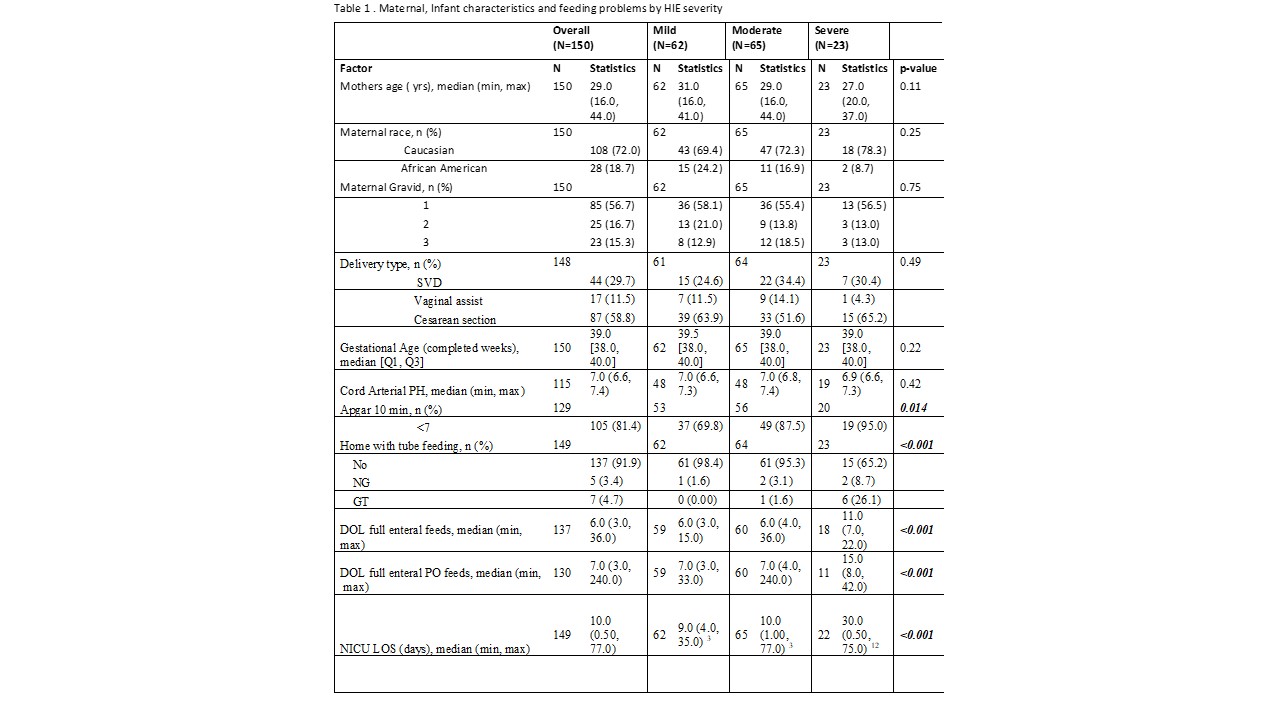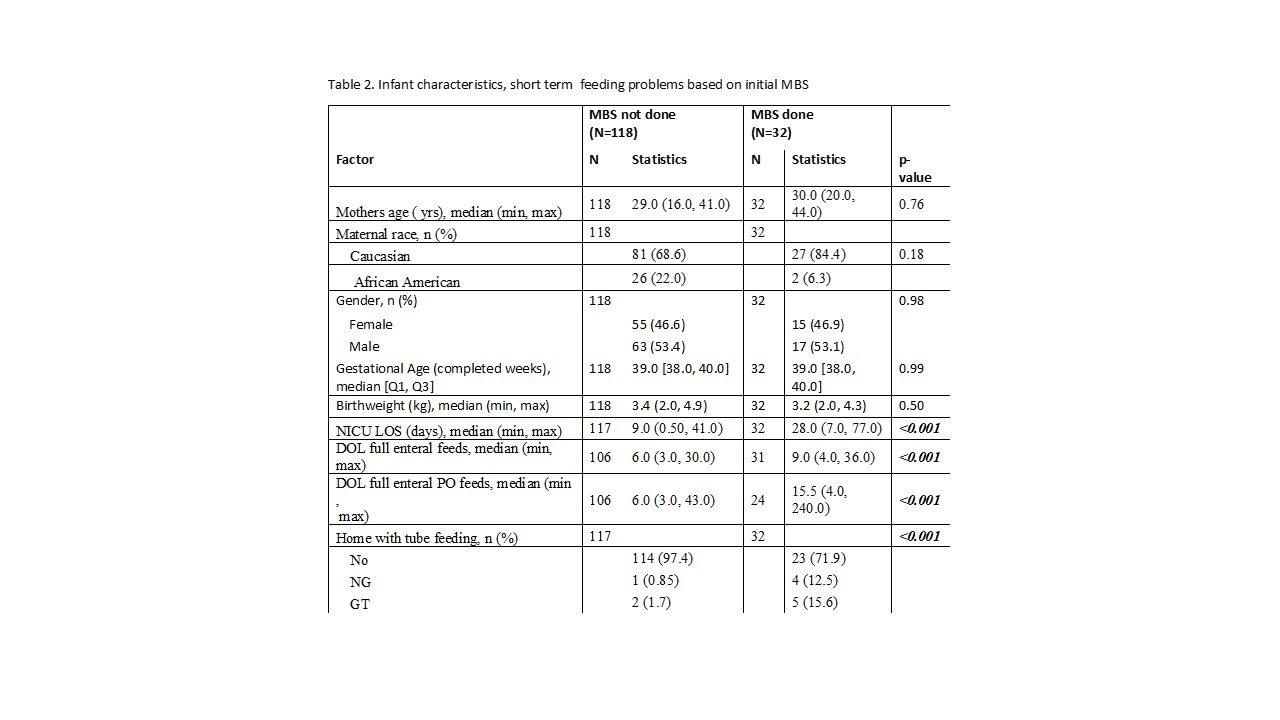Neonatal Follow-up
Category: Abstract Submission
Neonatal Follow-up II
251 - Feeding problems in infants with Hypoxic Ischemic encephalopathy (HIE)
Saturday, April 23, 2022
3:30 PM - 6:00 PM US MT
Poster Number: 251
Publication Number: 251.224
Publication Number: 251.224
Sreenivas Karnati, Cleveland Clinic Children's Hospital, Cleveland, OH, United States; Ceyda Acun, Cleveland Clinic Children's, Cleveland, OH, United States; Subhash Puthuraya, Cleveland Clinic Children's Hospital, Cleveland, OH, United States; Swetha Padiyar, Case Western Reserve University School of Medicine, Cleveland, OH, United States; Wei Liu, Cleveland Clinic Children's, Cleveland, OH, United States; Hany Aly, Cleveland Clinic Children's Hospital, Cleveland, OH, United States
- SK
Sreenivas Karnati, MD, DM, MRCPCH, FAAP
Clinical Assistant Professor , pediatrics/ Staff neonatologist
Cleveland Clinic Children's Hospital
Cleveland, Ohio, United States
Presenting Author(s)
Background: Early brain injury is known to have a deleterious impact on oral motor functions, which may lead to feeding problems. As survival with morbidity is increasing from HIE, the consequences of dysphagia, gastroesophageal reflux disease, and aspiration syndromes are also increasing
Objective: To describe the incidence of short- and long-term feeding problems in infants with HIE treated with therapeutic hypothermia (TH)
Design/Methods: Retrospective cohort study included all infants with HIE who underwent TH between January 2010 and December 2020 at a single tertiary level neonatal intensive care unit. The grade of neonatal encephalopathy was defined as either mild, moderate, or severe, based on a well-validated, standardized neurologic examination. Modified barium swallow (MBS) was performed by speech and language therapist if the baby was considered to be at risk for aspiration of feeds after initial assessment or if the baby developed symptoms suggestive of aspiration following initiation of feeds. If the baby failed a MBS, either appropriately thickened feeds or tube feeds were given. A repeat MBS was performed in 2 weeks. Babies who failed MBS repeatedly, were discharged home on either naso gastric tube feeds or gastrostomy tube feeds. These infants were followed in NICU follow up clinic for their growth and neuro development at 4-6 months, 10-12 months and at 2 years
Results: One hundred and fifty (150) infants were included, of which 62 had mild HIE, 65 moderate and 23 had severe HIE (Table 1). Thirty two infants had modified barium swallow (MBS) evaluations based on initial clinical examination. Of these, 10 (31%) were normal, 8 (25%) demonstrated dysphagia without aspiration and 14 (44%) babies had dysphagia with aspiration. Among the infants who had abnormal MBS, 12 ( 37%) babies were discharged home on tube feeds – 5 nasogastric and 7 babies with gastrostomy tube (Table 2) On long term follow up majority the feeding problems resolved by 12 months. Other feeding problems identified during follow up were mainly related to oral aversion and sensory issues.Conclusion(s): In this cohort of babies with HIE treated with TH, the incidence of feeding problem specifically swallowing difficulty was lower than previously reported. The swallowing problems improved in the majority of babies by the time of discharge. The long term follow up showed resolution of the feeding problems in nearly all of the treated infants by 12 months of age.
Maternal, infant characteristics , HIE severity
Initial MBS and infant, maternal characteristics
Objective: To describe the incidence of short- and long-term feeding problems in infants with HIE treated with therapeutic hypothermia (TH)
Design/Methods: Retrospective cohort study included all infants with HIE who underwent TH between January 2010 and December 2020 at a single tertiary level neonatal intensive care unit. The grade of neonatal encephalopathy was defined as either mild, moderate, or severe, based on a well-validated, standardized neurologic examination. Modified barium swallow (MBS) was performed by speech and language therapist if the baby was considered to be at risk for aspiration of feeds after initial assessment or if the baby developed symptoms suggestive of aspiration following initiation of feeds. If the baby failed a MBS, either appropriately thickened feeds or tube feeds were given. A repeat MBS was performed in 2 weeks. Babies who failed MBS repeatedly, were discharged home on either naso gastric tube feeds or gastrostomy tube feeds. These infants were followed in NICU follow up clinic for their growth and neuro development at 4-6 months, 10-12 months and at 2 years
Results: One hundred and fifty (150) infants were included, of which 62 had mild HIE, 65 moderate and 23 had severe HIE (Table 1). Thirty two infants had modified barium swallow (MBS) evaluations based on initial clinical examination. Of these, 10 (31%) were normal, 8 (25%) demonstrated dysphagia without aspiration and 14 (44%) babies had dysphagia with aspiration. Among the infants who had abnormal MBS, 12 ( 37%) babies were discharged home on tube feeds – 5 nasogastric and 7 babies with gastrostomy tube (Table 2) On long term follow up majority the feeding problems resolved by 12 months. Other feeding problems identified during follow up were mainly related to oral aversion and sensory issues.Conclusion(s): In this cohort of babies with HIE treated with TH, the incidence of feeding problem specifically swallowing difficulty was lower than previously reported. The swallowing problems improved in the majority of babies by the time of discharge. The long term follow up showed resolution of the feeding problems in nearly all of the treated infants by 12 months of age.
Maternal, infant characteristics , HIE severity

Initial MBS and infant, maternal characteristics

